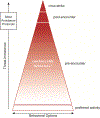Avoidance Problems Reconsidered
- PMID: 30984805
- PMCID: PMC6456067
- DOI: 10.1016/j.cobeha.2018.09.002
Avoidance Problems Reconsidered
Abstract
Active avoidance is the prototypical paradigm for studying aversively-motivated instrumental behavior. However, avoidance research stalled amid heated theoretical debates and the hypothesis that active avoidance is essentially Pavlovian flight. Here I reconsider key "avoidance problems" and review neurobehavioral data collected with modern tools. Although the picture remains incomplete, these studies strongly suggest that avoidance has an instrumental component and is mediated by brain circuits that resemble appetitive instrumental actions more than Pavlovian fear reactions. Rapid progress may be possible if investigators consider important factors like safety signals, response-competition, goal-directed vs. habitual control and threat imminence in avoidance study design. Since avoidance responses likely contribute to active coping, this research has important implications for understanding human resilience and disorders of control.
Conflict of interest statement
Conflict of interest statement Nothing declared.
Figures




References
-
- Baker TB, Piper ME, McCarthy DE, Majeskie MR, Fiore MC: Addiction motivation reformulated: An affective processing model of negative reinforcement. Psychol Rev (2004) 111(1):33–51. - PubMed
-
- Everitt BJ, Robbins TW: Drug addiction: Updating actions to habits to compulsions ten years on. Annual review of psychology (2016) 67(23–50. - PubMed
-
- Gillan CM, Morein-Zamir S, Urcelay GP, Sule A, Voon V, Apergis-Schoute AM, Fineberg NA, Sahakian BJ, Robbins TW: Enhanced avoidance habits in obsessivecompulsive disorder. Biol Psychiatry (2014) 75(8):631–638. This paper uses a novel outcome-devaluation procedure to demonstrate that habits play a larger role in AR performance for OCD patients relative than controls. After disconnecting shock cables in view of the participants, OCD patients emitted significantly more ARs in extinction. Outcome-devaluation effects are rare in the avoidance literature, and this laboratory has published related effects in rats implicating US-omission and possibly safety signals in goal-directed avoidance [48–50]. - PMC - PubMed
Grants and funding
LinkOut - more resources
Full Text Sources
